But given those three and half millenia, it'd be a bit much to expect one dictionary to cover the lot. And indeed, one dictionary does not cover the lot. Dimitrakos' dictionary from the 1950s claimed to, but really, it fooled noone, and just ended up doing neither Ancient nor Modern Greek properly. (The link is to someone who's put all 15 volumes of the bally thing online. In DjVu, but that's still damn impressive.)
The problem with Greek lexicography is, there are a lot of quite disparate scholarly communities interested in the various stages of Greek; so its lexical coverage ends up more fragmented than it might. Which means that if you're trying to lemmatise the whole lot (as I do), you've got a lot of partly overlapping sources of lexicon. (Lemmatising the whole lot is a pretty fraught exercise; but given that you already have Homeric, Doric, and Attic Greek to deal with Ancient drama anyway, lemmatising even Classical Greek is an exercise in multilingualism.)
I'll start explaining the mess that is the lexicography of Greek by drawing a grid:
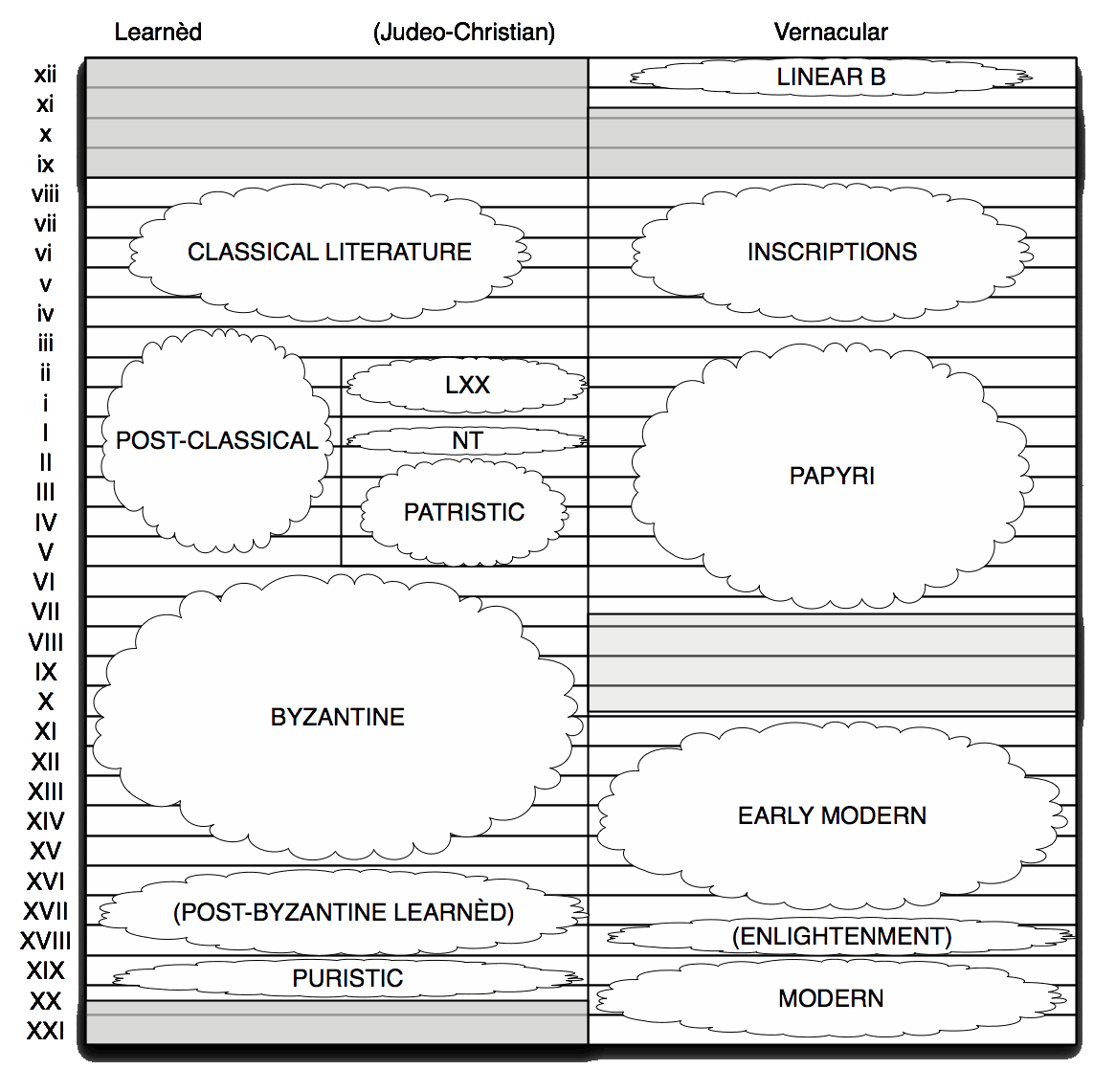
The first thing that's wrong with this grid is that each century is equally wide. The proportion of surviving text from different centuries varies prodigiously, but I'll just ignore that here.
There has always (well, almost always) been a distinction in Greek between a literary and a vernacular language. At the start, it's because the literary language was a convetionalised mix of dialects. That's true of the way Homer's work ended up put together, and it's also true of the literary conventions around poetry, including drama. The dialects of Greek as they were actually spoken are more closely reflected in the inscriptions, although they aren't immune from conventionalisation either.
Attic prose may have initially been pretty much the spoken language of Athens; but when the spoken language had evolved far enough away from Attic, diglossia kicked in: literary writing kept trying to move away from the spoken language, and closer to Attic (or later Koine) for the next couple of millennia. If you want evidence of what the spoken language was like, your main evidence becomes the papyri, which contain a lot of disposable (and disposed) Greek. Once the papyri stop a little after the Arabisation of Egypt, direct evidence of the vernacular dries up too—and there was never all that much evidence outside of Egypt; it resumes in the 12th century with the beginning of early modern literature. The early modern evidence is not unproblematic, and there's not exactly no evidence at all in the lead-up to it; but the gap in the grid is there for a reason.
A further split happens between Judaeo-Christian and Pagan writing. The split in the beginning is to some extent linguistic: the Septuagint is to some extent vernacular Koine, but also to a significant extent translationese. The New Testament is quite heterogeneous linguistically, but can also in places be quite vernacular. But once the Patristic period kicks in, the distinction is mainly in the scholarship surrounding the two traditions. Classicists are still involved in the study of late antiquity, and pagan authors usually made a real effort to conform to the rules of Classical Greek.
On the other hand, though we have a lot of activity in new editions of Church Fathers, the corpus is huge, and for a lot of texts we still only have the slapdash Migne editions to rely on. And while a lot of the oddities of their language can be chalked up to how those editions were copy-pasted from 16th century editions, there's still a sense that the Church Fathers are taking more liberties with the language than an Atticist would tolerate: not just in the direction of the vernacular (indeed, not even primarily in the direction of the vernacular), but boldly stepping into linguistic phantasy. This gets more pronounced in time, up to the eccentricities of Theodore of Studium, or the impenetrability of Eustathius of Thessalonica.
But what's important about the Church Fathers is not just that their editions need revising or that their language is odd. It's that the classicists don't go near them. Christian late antiquity is done by different scholars than pagan late antiquity; so there is not going to be one dictionary spanning the two. The height of absurdity in this is in LSJ (and thankfully they at least admit that it's absurd.) Nonnus of Panopolis, in his pagan youth, wrote a turgid Homeric retelling of the exploits of Dionysus. This is about the last pagan literary work there is, and it's the endpost of the Classical canon; so its coinages are duly included in LSJ. In his dotage, Nonnus had good enough survival instincts to become not just a Christian, but a bishop. And Nonnus (or at least someone claimed to be Nonnus) wrote a no less turgid Homeric retelling of the Gospel of John. Which LSJ excludes. So, the dictionaries list the words the young Nonnus made up; and because of his switch, they don't list the words the old Nonnus made up.
And the imbalance is reflected in the attention paid to the texts themselves—which, to be fair, is not the Pagan Classicists' fault. The Dionysiaca may be turgid, but they preserve information about Greek Mythology not otherwise attested, and they continue to attract grudging interest (Google Nonnus+Dionysiaca: 8930 hits). John... well, we already have the original of that, so noone particularly cares about Nonnus' retelling: (Google Nonnus+"St John": 2870 hits. Surprised it's that much actually.)
So, we have a split between vernacular and literary Greek, and an added split between pagan and Judaeo-Christian Greek. Let's see how the dictionaries stack up.
The LSJ (Liddell–Scott–Jones–Mackenzie, plus 1996 Supplement) is the authoritative English-language dictionary of Classical Greek. It includes inscriptions and at least some papyri under its purview. It samples the Septuagint and the New Testament (though not at all exhaustively); everything Christian after that is out of bounds, and indeed successive 19th century editions kept eliminating references to "Ecclesiastical" Greek, to make way for more papyrological finds and more comprehensive Classical citations. Coverage of late antiquity peters off even for pagan authors, from what I've seen with the Neoplatonists. After a long period of hesitation about whether this Ventris business would really stand up, LSJ now includes Mycenaean in the 1996 Supplement. I have drawn the following work of fantasy to represent my construal of LSJ coverage:
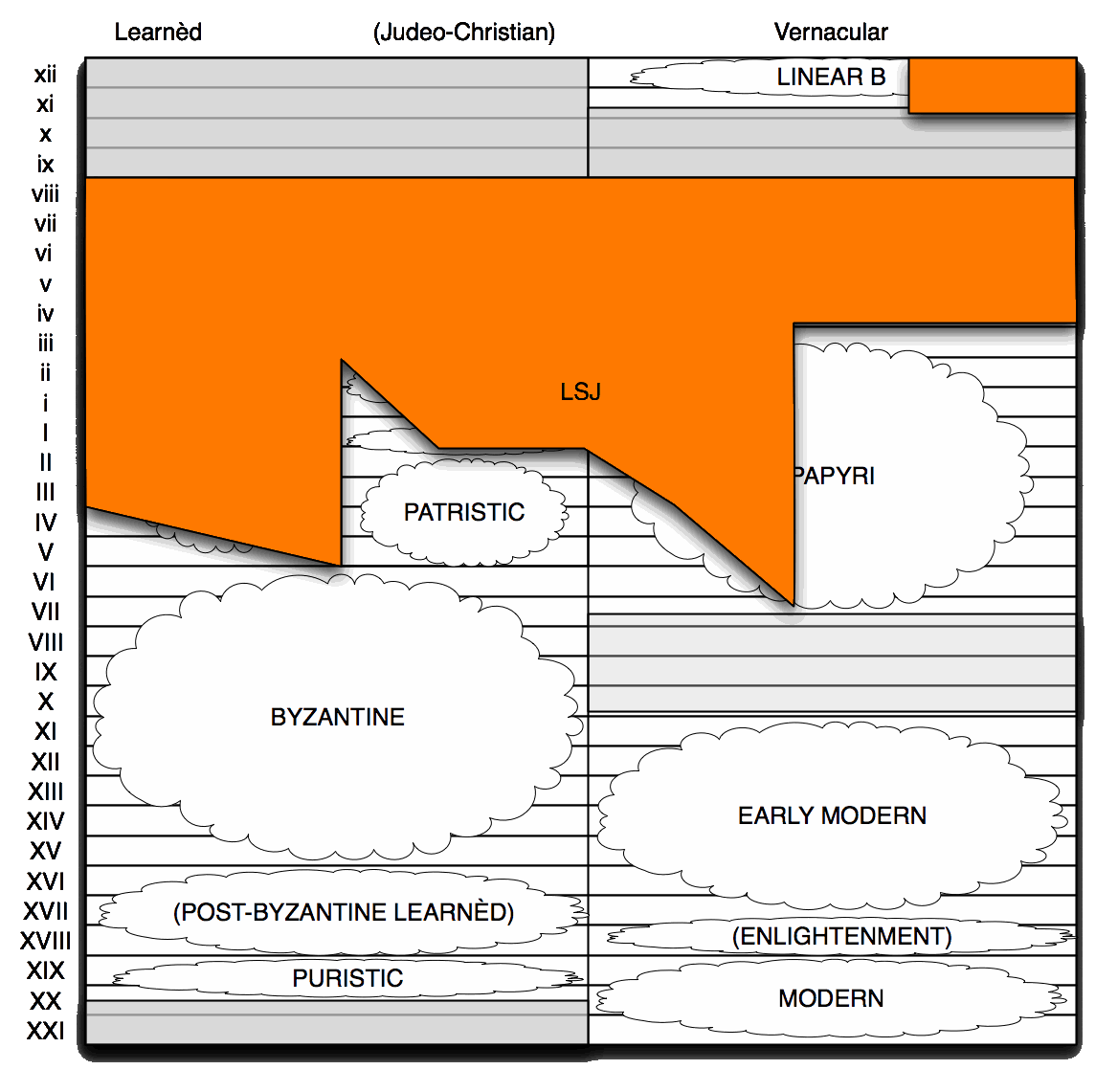
The DGE (Diccionario Griego-Español) has been going since 1980, and intends to supersede LSJ: when finished, it should be two or three times bigger. *When* finished; as it stands, it's up to ἐκπελεκάω at Vol. VI (2002), and has just gone back and redone Vol. I (2008). (Those of you following my comments already know what I think of this.) DGE does not shy away from either early Church Fathers or late antiquity, and aims to be comprehensive; they go through the TLG CD ROM indexes exhaustively to that end. An artist's impression of what the finished DGE might cover is as follows:
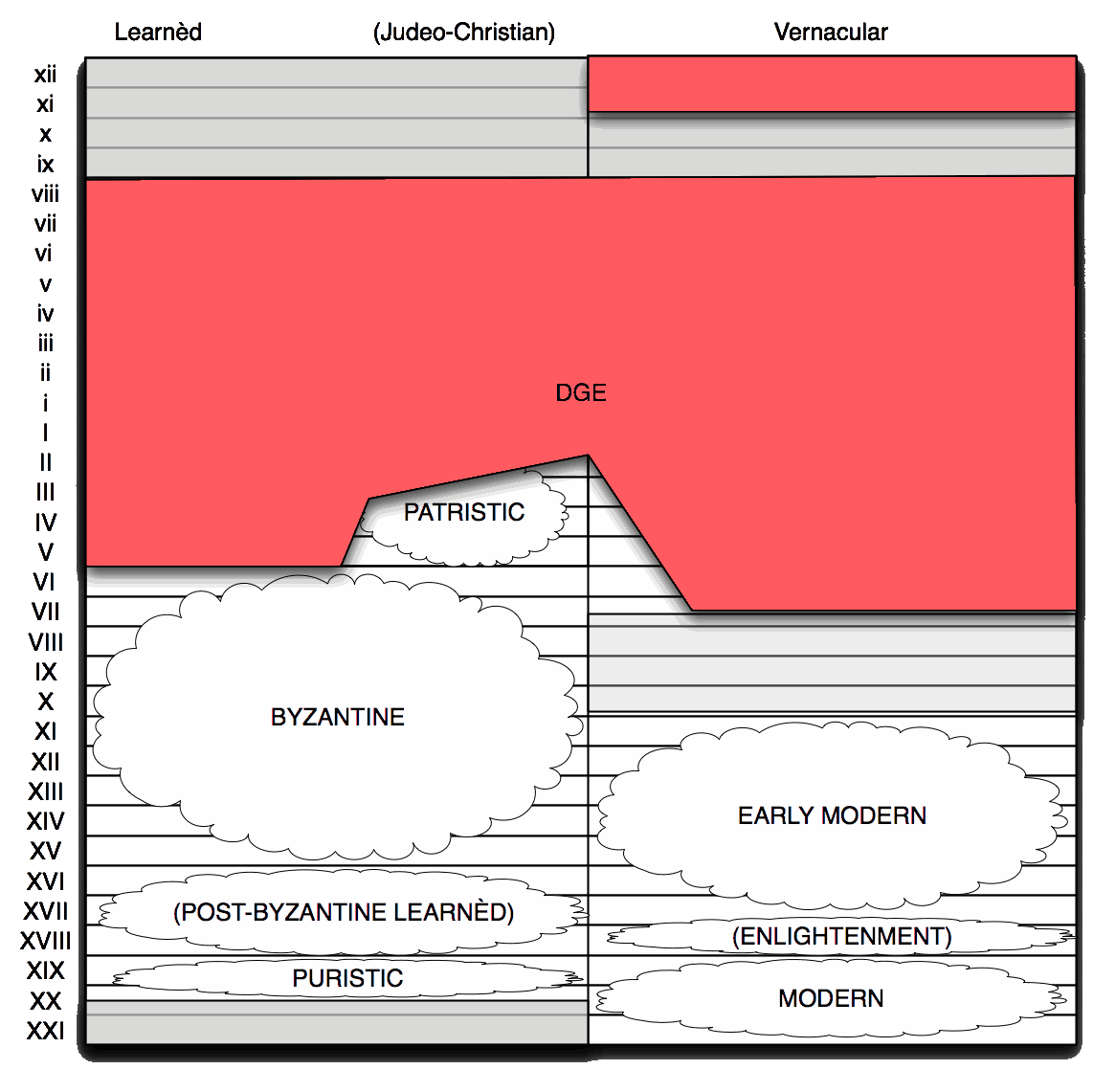
Once the Classicists are out of the way, Everything Else ensues.
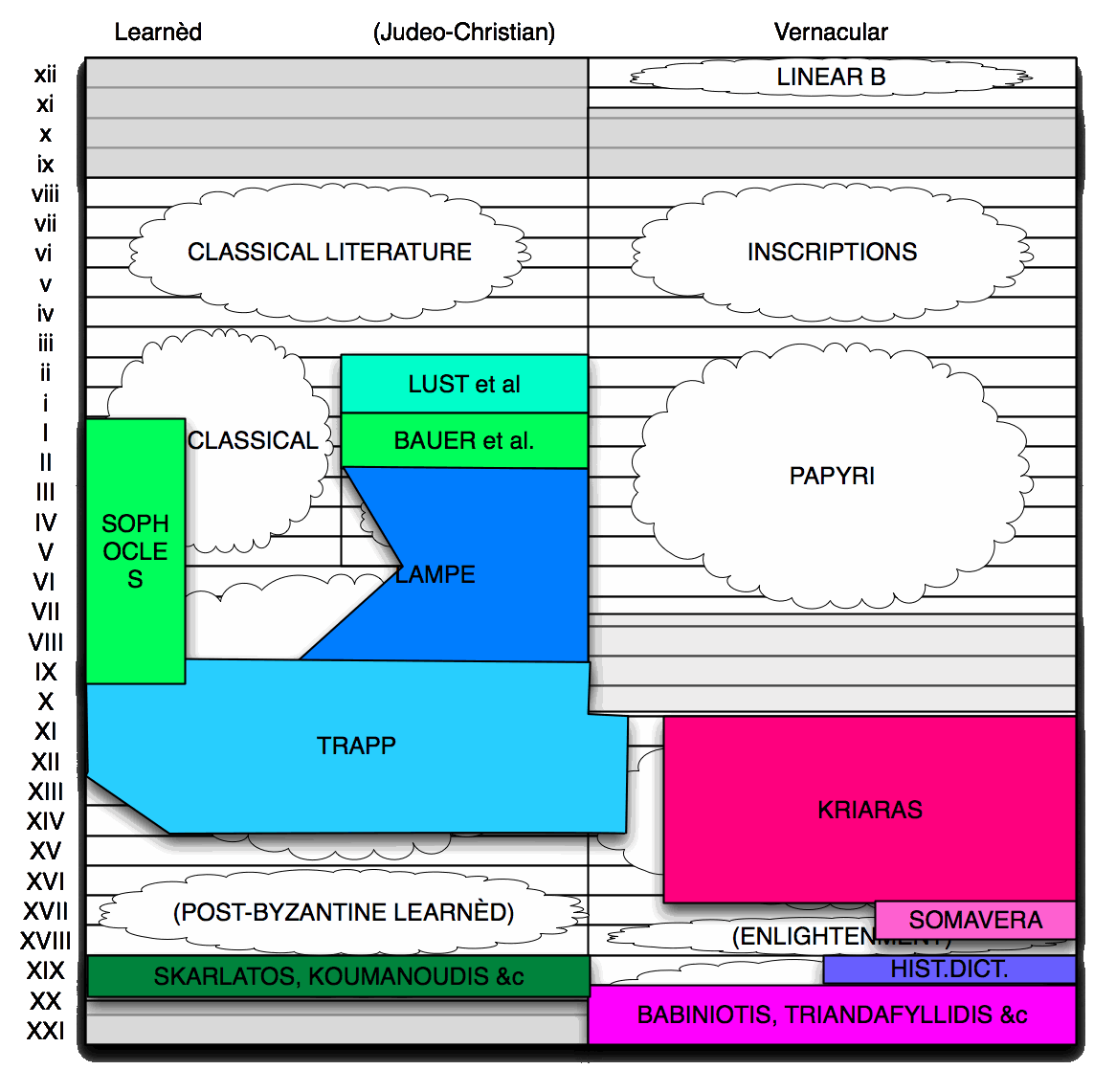
- The Septuagint is a stepchild text in general, because of the many untranslated Hebrew words in it. A modern dictionary of the Septuagint has been a very long time coming, but we now have Lust, Eynikel & Hauspie. The Hebrew words are in there, though the letters of the Hebrew alphabet (which show up in Psalms) are not. The proper names aren't; then again, proper names are usually a no-go for lexicographers anyway.
- The New Testament and early Christian literature are covered comprehensively by Bauer's Lexicon, updated as BDAG (Bauer Danker Arndt Gingrich). For once, this includes all proper names.
- GHW Lampe's Patristic Greek Lexicon (which is on BitTorrent. Wow. Just... wow. Google it yourselves...) covers the Apocrypha and the Church Fathers, up to around ix AD. The dictionary is theological, so goes into much semantic detail about common words; but it also has a lot of novel vocabulary. Not quite exhaustive (and anything not church-related is out of bounds), but very good breadth.
- EA Sophocles' Greek Lexicon of the Roman and Byzantine Periods goes up to 1100. It's old and relatively small, considering; but unlike other lexica, at least it goes all the way up to omega.
- E. Trapp's Lexikon zur byzantinischen Gräzität, now up to προσπεφυκώς in 6 vols, theoretically covers learnèd ix-xii AD Greek, so it picks up after Lampe. In practice, it's lenient about going forward in time and language: it slips in nonliterary vernacular, and after the lag in Kriaras, it's started sneaking in literary vernacular too. It also goes back in time, and fills in some of the gaps of LSJ—there are a couple of lemmata from Plutarch here that had otherwise slipped through. It is extremely comprehensive, although looking up words gets complicated by the variety of spelling in the texts.
- E. Kriaras' Λεξικό της Μεσαιωνικής Ελληνικής Δημώδους Γραμματείας, now up to πνεύμονας in 16 vols, covers vernacular Greek from 1100 to 1669. It's recently resumed publication after a ten year gap; the gap included preparing the Abridgement of vols 1-14, which is online. Again, comprehensive, though there are a few gaps in coverage—notably astrological texts. Looking up words is also complicated both by the lack of standard orthography in editions, and by Kriaras' own linguistic activism, which led to prescriptive spelling (so the entries are not just monotonic, but won't acknowledge the orthographic diversity of the words as found in texts.)
After Kriaras, things fall apart a bit. Modern Greek lexicography starts in the 17th century, with dictionaries by Meursius (Glossarium Graeco-Barbarum, 1614) and Somavera (Tesoro della lingua greca-volgare ed italiana, 1709). The Puristic of the new Greek State is covered in Skarlatos Byzantios (Λεξικόν της καθ' ημάς ελληνικής διαλέκτου, μεθηρμηνευμένης εις το αρχαίον ελληνικόν και το γαλλικόν, first ed. 1835), and more intriguingly Koumanoudis (1883 and 1900, Συναγωγή νέων λέξεων υπό των λογίων πλασθεισών): Puristic was in a frenzy of neologism, and Koumanoudis tracked the first appearance of neologisms back to 1453.
Greek dialect is covered in the Historical Dictionary of Modern Greek (5 vols, up to δαχτυλωτός)—a long story, to take up elsewhere. Of the dialects of Modern Greek different enough from the standard to make note of, there are (complete) large Academy dictionaries for Pontic, Italiot, and Tsakonian (Papadopoulos, Karanastasis, Costakis); a scholarly dictionary for Western Cretan (but not Eastern) (Xanthinakis); and several (not so large) dictionaries of Cypriot. Cappadocian and Mariupolitan have missed out. Mainstream dialects have a lot of little glossaries; but as far as I can recall, it's been over a century since any of them were written by a professional linguist. There were several dictionaries of Modern Greek in the 20th century, but properly modern dictionaries did not happen until the very end of the century, with the dictionaries of Babiniotis, the Triandafyllidis Institute, and Kriaras.
Now, if we superimpose LSJ on Everything Else, we get the following:
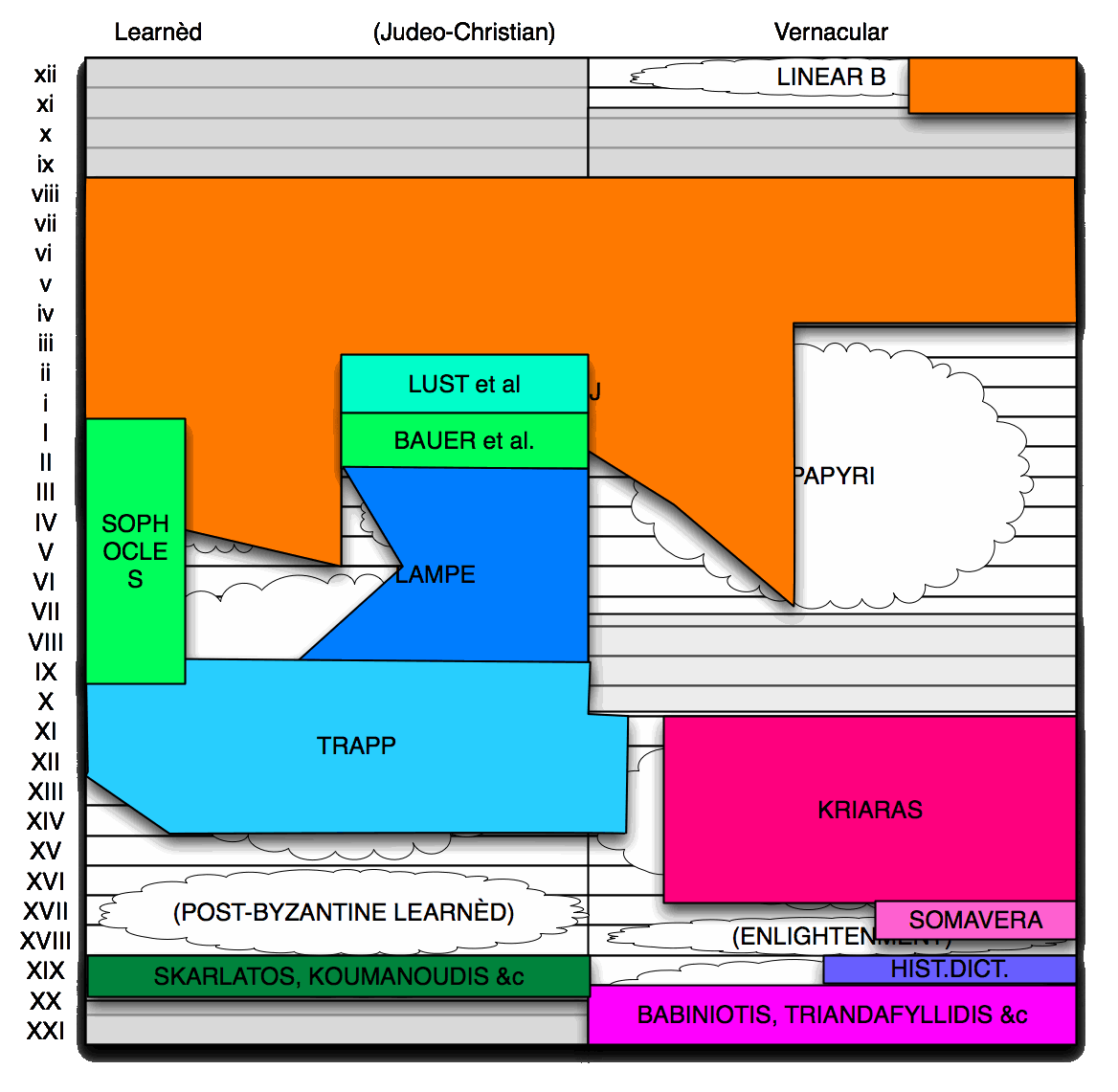
This tells us where our major gaps are:
- After the Fall of Candia, with which Kriaras delimits his dictionary, there is nothing systematic of literary use of the vernacular up to the 20th century. There wasn't a massive amount going on in the following hundred years, but there were some things (and Knös' history of Greek literature seems to have listed much of it). The literary histories tells you Crete passed the literary torch on to the Ionian Islands; but noone reads what they did in the early 18th century either. Editorial activity around 17th into 18th century literature has lagged too. By the Greek Enlightenment there was a lot going on, from both the Ionian Islands and the Phanariotes of Constantinople and Romania; but there's no dictionary for them.
- Even less attention gets paid to learnèd Greek in Ottoman times, and that's to a significant extent ideological: both because learnèd Greek was on the wrong side of the diglossia controversy, and because it was by then a well and truly artificial language. Still, it's Greek, and as Koumanoudis found, they kept making words up. Outside Koumanoudis, no dictionary for them either.
- If you're Gennadius Scholarius, you're particularly unlucky: being the first Ottoman Patriarch of Constantinople, noone's going to put your vocabulary in a dictionary, because you're just outside the Byzantine period. As my colleague of two months Andreas Rhoby recently published (Rhoby, A. 2007. Varia lexicographica. Jahrbuch Österreichischer Byzantinistik 57:1–16)—and as I found independently the following year—that means the first known instances of ἀτομικός "individual" and ἀτομίζω "individuate" don't end up in the dictionaries: Trapp only has the adverb ἀτομικῶς, and Koumanoudis only refers it to recent dictionaries. (Oh, and that's "individual", not "atomic": people were indivisible before submolecular particles were.)
- The papyri look gapped in the diagram, but that's because I've never set eyes on Preisigke's Wörterbuch der griechischen Papyruskunden. The TLG has only a small number of papyri represented, so it hasn't been a real issue.
- The real problem gap is secular writing, from say the fourth century to the eighth. Sophocles provides some coverage of the period, but not nearly enough. The literature of the period does not have a good rep, and without theologians involved, it just hasn't been covered properly. This visibly affects the Neoplatonists (though at least Plotinus got his own dictionary—hey, is that Russian site allowed to put a 1980 book online? Wonder how long that link lasts). But the ones who really suffer are the medical authors, certainly Galen (who has a huge corpus, too much of it still in an 1820s edition), but also his successors like Oribasius or Paul of Aegina. DGE will probably do some to breach that gap (they've certainly done a lot with the herbalist Pedanius Dioscorides, though he is much earlier); but some medicos will still be too late for it.

 Loading...
Loading...
I can't help but wonder where the Astronautilia would go on that chart. Post-Byzantine Learnèd?
ReplyDeleteYes, Astronautilia would (Homerically phrased sci fi), as would the Ancient Greek Harry Potter. It's a somewhat arbitrary call, but there will inevitably be post-Classical vocab in such texts, and that vocab does inevitably draw on Modern Puristic Greek, so I'd be reluctant to put it in the same basket as Homer and Lucian (the respective literary models).
ReplyDeleteOn the other hand, Post-Byzantine Learnèd is eclectic enough to allow Homeric pastiche; I'm not sure Puristic is eclectic enough. (It *is* eclectic, just not Homerifically so.)
And it's also eclectic enough to allow Patsy Cline Greeked by one William "Blathers" A. of aoidoi.org. (Thanks for that site too, btw; I've made my own nefarious use of it in my time...)
ReplyDeleteAnd please, more blogging *in* ancient Greek! ἀντέσχε καὶ δούλευσον! :-)
Your post on e-humanities is a bit close to home to my day job; will need to write something about it eventually.
... Also eclectic enough, I daresay, to include Tipoukeitos' rendering of the Benigni against Berlusconi verse, Se quella notte, per divin consiglio... (If on that night, the divine Hand as her guide...): Εἴθ’ ὤφελε μὲν ᾗ νυκτί γ’ ἡ μήτηρ τὸν ἄνδρ’/ἐκύσαθ’, ὃς...
ReplyDeleteAnd it's also eclectic enough to allow Patsy Cline Greeked by one William "Blathers" A. of aoidoi.org.
ReplyDeleteWell, I tend to avoid new-fangled words in my own versifying. The less I have to worry about vowel lengths in imported vocabulary, the happier I am.
The Tipoukeitos is nicely done.
I've been surprised how often the LSJ fails me when I need to check words from Pseudo-Callisthenes.
I've been using Dimitrakos lately to bolster up Byzantine vocabulary (for those last letters of the alphabet Trapp hasn't got to yet). I've been pleasantly surprised at his coverage of Late Learnèd Byzantine texts.
ReplyDeleteSmart post admin
ReplyDeleteI hope to visit my blog and subscribe to me :)
Ancient Egypt Map and Ancient Egyptian Names
Thanks for taking the time to discuss this, I feel strongly about it and love learning more on this topic. best school in mayur vihar If possible, as you gain expertise, would you mind updating your blog with extra information? It is extremely helpful for me.
ReplyDeletenvest with 200$ and get a returns of 5,000$ within seven business working days.
ReplyDeleteWhy wasting your precious time online looking for a loan? When there is an opportunity for you to invest with 200$ and get a returns of 5,000$ within seven business working days. Contact us now for more information if interested on how you can earn big with just little amount. This is all about investing into Crude Oil and Gas Business.
Email: investmoneyoilgas@gmail.com
The default gateway IP address comes pre-assigned by your internet service provider, however, a user can configure it par to needs. It is often changed to prevent bad guys access your admin panel, prevent DDoS attacks, or just to add an additional layer of safety. Here’s how to do it – 192.168.1.1
ReplyDelete